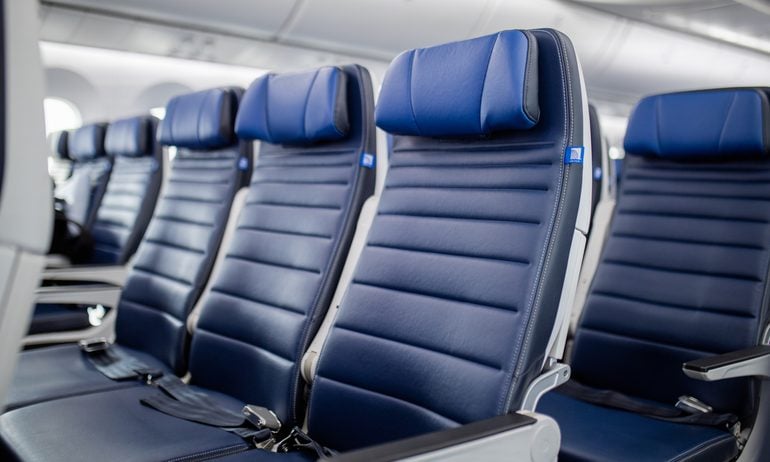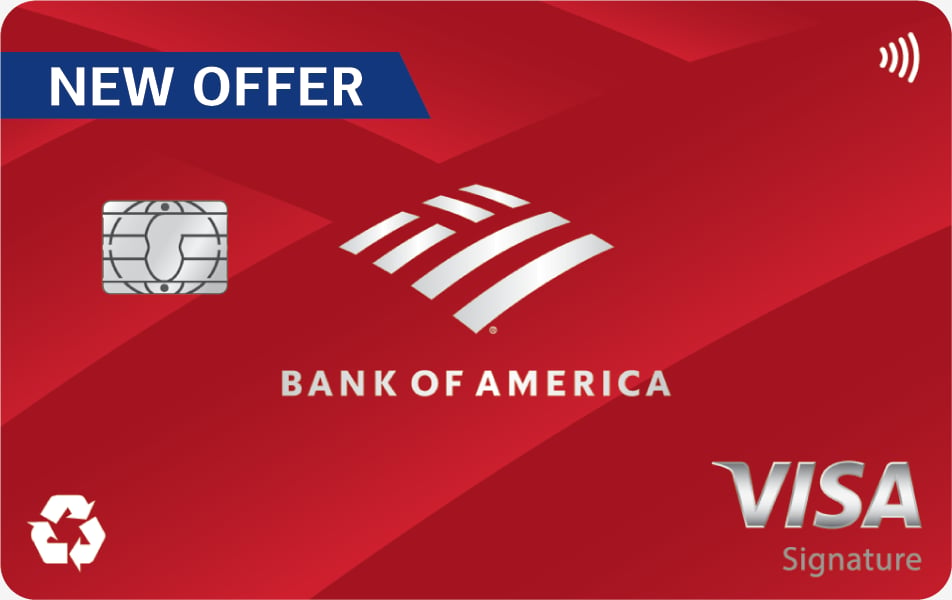Basic Economy vs. Main Cabin: What’s The Difference?
Basic economy seats come with cheaper fares, but seat selection and baggage is limited and varies between airlines.

Many or all of the products on this page are from partners who compensate us when you click to or take an action on their website, but this does not influence our evaluations or ratings. Our opinions are our own.
Changes or cancellations are not allowed with most basic economy fares but are free for many main cabin fares.
Seat selection is limited in basic economy, which can be hard for families and those who hate the middle seat.
Most basic economy fares do not earn as many (or any) miles, but this varies significantly by airline.
Changes or cancellations are not allowed with most basic economy fares but are free for many main cabin fares.
Seat selection is limited in basic economy, which can be hard for families and those who hate the middle seat.
Most basic economy fares do not earn as many (or any) miles, but this varies significantly by airline.
What’s the difference between basic economy versus main cabin? With most airlines, there’s no difference between the physical seats. But the policies outside of your seats — like how much luggage you can bring and how easy (and cheaply) you can change your flights — can be significantly different. And you’ll find that often, when it comes down to deciding between basic economy versus main cabin, the most noticeable difference is typically cost.
Basic economy fares can be significantly cheaper than the main cabin. But these fares, which major airlines introduced to compete with low-cost airlines like Spirit and Frontier, carry significant limitations to flexibility and creature comforts. However, you lose out on flexibility for flight changes and/or cancellations, there’s likely no seat selection option and you might not even be able to earn miles.
Love them or hate them, basic economy fares are here to stay.
Beyond this simple tradeoff, each airline handles its basic economy fares differently. Some make things confusing by calling them by different names, such as “Saver” fares. So is it worth it to pay for the price difference between basic economy and main cabin fares?

Price differences between basic economy and economy tickets
Deciding whether to cheap out with basic economy seats largely depends on your travel style and how much flexibility you need. But it can also come down to how significant the price difference really is.
The markup between basic economy and main cabin tickets can vary widely by both airline and specific flight route. We compared data for dozens of round-trip routes in 2024 for each of the following airlines to determine an average price difference between the two fares.
Airline | Average difference in cost between main cabin and basic economy round-trip fares |
|---|---|
Alaska Airlines | $73. |
American Airlines | $72. |
Delta Air Lines | $70. |
Hawaiian Airlines | $80. |
JetBlue Airways | $53. |
United Airlines | $49. |
» Learn more: The best airline credit cards right now
Basic economy rules by airline
Seeing an overview of the restrictions and allowances that differ between airlines can help paint a picture of the varied landscape of basic economy tickets. We’ll dive deeper into these differences in the next section.
Airline | Fare name | Restrictions | Allowances |
|---|---|---|---|
Alaska Airlines |
|
| |
American Airlines |
|
| |
Delta Air Lines |
|
| |
Hawaiian Airlines | Main cabin basic |
|
|
JetBlue | Blue basic |
|
|
United Airlines |
|
|
Major differences between basic economy and economy inclusions
Let's look closer at the differences related to changes and cancellations, seat selection, carry-on bag allowance, and the ability for travelers to earn miles or qualify for elite status.
Trip modifications
Among U.S. airlines, only JetBlue allows any changes or cancellations on basic economy fares, though it charges a fee to make these adjustments. Other airlines simply do not allow changes on these fares, which means you’ll have to buy a completely new ticket if your plans change.
Airline | Ability to change or cancel ticket |
|---|---|
Alaska Airlines. | No. |
American Airlines. | Yes, for a fee (coming in 2024). |
Delta Air Lines. | No. |
Hawaiian Airlines. | No. |
JetBlue. | Yes, for $100 on routes in North America, Central America, and the Caribbean. Or, $200 for all other routes. |
United Airlines. | No. |
Now that most airlines have eliminated change fees altogether, this is a huge difference from main cabin fares.
If you do need to change your basic economy fare, some airlines offer a workaround: upgrading your basic economy fare to economy. For example, United lets you upgrade your Basic Economy ticket to a United Economy fare for an additional charge, unlocking the ability to change or cancel your flight without paying a change fee.
Of course, it’ll still cost money to upgrade your trip (typically starting at $30 each direction), so it would be better to book a standard economy fare upfront if it’s likely you’ll need to make a change. But in a bind, that can save you money.
Seat selection
All U.S. airlines, except American Airlines, have strict restrictions on seat selection for basic economy fares. The rules and wording of these restrictions differ from airline to airline, but amount to the same thing: You can’t choose your seat ahead of time, and you will get your seat assigned at check-in.
This indicates two realities for basic economy tickets:
You are more likely to get stuck in a middle seat, near the back of the plane.
It might be difficult to sit with other members of your party (though gate agents are sometimes accommodating for families).
Airline | Seat selection |
|---|---|
Alaska Airlines. | No. |
American Airlines. | Yes, for a fee. |
Delta Air Lines. | No. |
Hawaiian Airlines. | No. |
JetBlue. | No. |
United Airlines. | No. |
One notable exception is American Airlines, which does allow seat selection ahead of time on basic economy fares, but it typically charges a fee. (The fee is waived in some situations, such as holding higher tiers of AAdvantage elite status). That said, if you don’t have elite status and find yourself paying the seat selection fee anyway, you may as well upgrade to the main cabin, since they roughly amount to the same thing.
Carry-on bags
Basic economy luggage rules can be particularly confusing since airlines have inconsistent policies. Many have changed their rules since rolling out basic economy fares.
JetBlue and United don’t allow overhead carry-on bags for basic economy passengers and could charge a hefty fee if you try to bring one. When you fly either airline, you can still bring a bag that fits underneath the seat, but you will not have access to the overhead bin. Pack light, or prepare to check your luggage (which also typically entails a separate baggage fee).
All other airlines allow overhead carry-on bags for basic economy fares.
Airline | Overhead carry-on allowance |
|---|---|
Alaska Airlines. | Yes. |
American Airlines. | Yes. |
Delta Air Lines. | Yes. |
Hawaiian Airlines. | Yes. |
JetBlue. | No. |
United Airlines. | No. |
Earning miles
This is yet another area where airline rules differ significantly and where some airlines have changed their own rules in recent years.
This differentiator breaks down to two key questions:
Do passengers earn redeemable frequent flyer miles on basic economy fares?
Do these flights count toward earning elite status?
Within these, some airlines offer the same rate of earning miles and elite status for both basic economy and main cabin fares, while others offer lower earning rates for basic economy.
Airline | Redeemable miles | Elite qualification |
|---|---|---|
Alaska Airlines. | Reduced rate. | Full rate. |
American Airlines. | Reduced rate. | Full rate. |
Delta Air Lines. | No miles earned. | No. |
Hawaiian Airlines. | Full rate. | Full rate. |
JetBlue. | Reduced rate. | Reduced rate. |
United Airlines. | Reduced rate. | Reduced rate. |
The best basic economy airline
We compared 10 full-service, U.S.-based airlines across the basic economy-related categories outlined above and created a five-point score for each. And when picking the best basic economy package by airline, there’s a winner, and then there’s perhaps more of an ‘actual’ winner.
Southwest Airlines “wins,” but with a caveat. The airline, which is already famous for its low fares, doesn’t offer a true basic economy ticket. Of the airlines who offer a separate fare called “basic economy,” American Airlines offers a better experience than its competitors.
There are also some clear losers: Delta Air Lines basic economy is the worst. Frontier Airlines and Spirit Airlines aren’t far behind.
Every other airline scored in what you might consider the middle of the pack, but they don’t offer great basic economy products. United Airlines, Alaska Airlines, JetBlue Airways and Hawaiian Airlines all get a measly score of just 1.9.
Winner: Southwest Airlines (sort of)
Its lowest fare class, called “Wanna Get Away” offers more benefits than what even economy on most other airlines offer.
There are no change fees (assuming you change at least 10 minutes before your flight’s scheduled departure). You can bring two checked bags for free. And yes, you get the standard two carry-ons (one personal item and one bag).
Southwest is unconventional, and we didn’t feel like it was fair to solely crown Southwest the king since it doesn’t have an economy versus basic economy option.
Winner: American Airlines
After reviewing the full breakdown of restrictions and allowances, we’ve determined that American Airlines offers the best true basic economy tickets for travelers.
American wins for a few reasons: It allows seat selection (for a fee), elite upgrades and standby travel. Basic economy fares provide a significant cost savings over standard economy. Plus, you still get that comfortable main cabin seat, free snacks, soft drinks and in-flight entertainment that generally make American Airlines one of the better onboard experiences out there anyway.
When to choose basic economy
The logic of basic economy is simple from the airlines’ perspective: They want to entice you with low fares in search results and then bump up the price by making basic economy seem very unappealing.
Some airlines even make it quite difficult to book a basic economy fare at all.
This creates an opportunity — and dilemma — for any budget-conscious traveler. Should you save the money on the raw airfare cost and lose some privileges, like seat selection? Or pony up the cost to “upgrade” your ticket to the main cabin?
Here’s a good rule of thumb for when to choose basic economy:
Your plans are absolutely firm.
You are traveling alone.
You don’t care about earning points and elite status.
You don’t mind where you sit (or at least, you’re willing to deal with the middle seat if it means saving money).
If that doesn’t sound like you, consider booking a main cabin fare.
» Learn more: When should you book basic economy?
The bottom line
Overwhelmed yet? Don’t be. Airlines have made the world of basic economy a complicated mess, but the logic is fairly straightforward: You should choose these ultracheap tickets when the benefits outweigh the costs. If you don’t care about seat selection, earning miles and bringing an overhead carry-on (in some cases), you can truly take advantage of basic economy fares.
“Basic economy” does not mean the same thing across all airlines. American offers comparatively generous basic economy fares, while Delta might make basic economy passengers feel pretty undervalued.
How to maximize your rewards
You want a travel credit card that prioritizes what’s important to you. Here are some of the best travel credit cards of 2025:
Flexibility, point transfers and a large bonus: Chase Sapphire Preferred® Card
No annual fee: Wells Fargo Autograph® Card
Flat-rate travel rewards: Capital One Venture Rewards Credit Card
Bonus travel rewards and high-end perks: Chase Sapphire Reserve®
Luxury perks: The Platinum Card® from American Express
Business travelers: Ink Business Preferred® Credit Card
Bank of America® Customized Cash Rewards credit card
Cash Back
Earn 6% cash back in the category of your choice – for the first year. Plus, get a $200 online cash rewards bonus offer!






